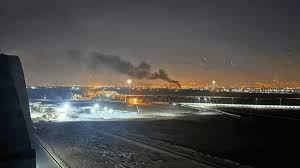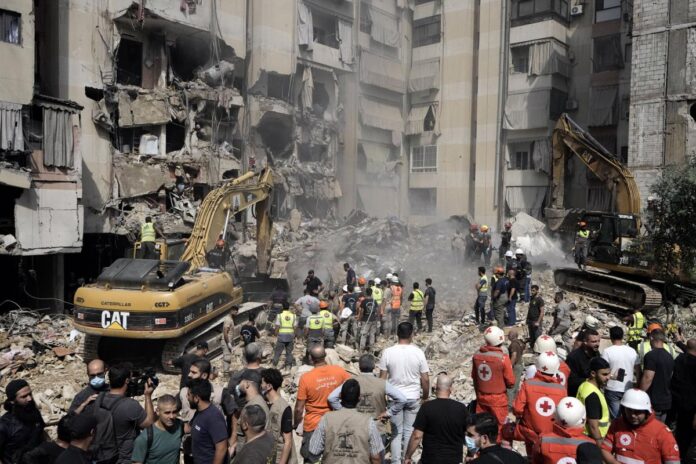Israel’s Bold Strike: 100 Planes Attack Iran’s Military Facilities in “Days of Repentance” Operation
In a dramatic escalation of regional tensions, Israel launched a daring military operation, deploying over 100 warplanes to strike deep inside Iran. The operation, dubbed “Days of Repentance,” saw Israeli forces flying 2,000 kilometers to target critical military facilities across Iran, while carefully avoiding nuclear and oil infrastructure. The coordinated attack unfolded in three powerful waves, aiming to destabilize Iran’s defense capabilities.
This unprecedented mission is a stark reminder of the high-stakes chess game unfolding in the Middle East, with Israel showing its readiness to neutralize perceived threats from Iran’s growing military power.

The Mission: Three Waves of Tactical Strikes
The “Days of Repentance” operation was meticulously planned and executed in three distinct waves:
- First Wave – Disabling Defense Systems: In the initial strike, Israeli planes focused on Iran’s air defense systems, aiming to blindfold the Iranian military by knocking out its first line of defense. This strategic move set the stage for subsequent attacks and prevented Iran from mounting a rapid response.
- Second and Third Waves – Targeting Missile and Drone Bases: Following the initial strike, Israeli forces attacked missile and drone bases, crippling Iran’s ability to launch retaliatory strikes. With drones and missiles being critical assets for Iran, this wave of attacks was designed to severely degrade its offensive capabilities.
The entire operation involved a fleet of Israeli jets, including advanced F-35 fighter planes, which flew in unison to deliver a powerful message to Tehran. Reports indicate that Israel carefully avoided targeting nuclear and oil facilities, a calculated move to prevent the conflict from spiraling into a full-blown war with unpredictable repercussions.
Why Israel Launched “Days of Repentance”
This operation is more than just a show of force; it’s a direct response to the escalating security threat posed by Iran’s expanding military infrastructure. Israel has long voiced concerns over Iran’s growing influence in the region, its support for proxy groups, and its expanding missile capabilities. In recent months, intelligence reports suggested an increase in Iran’s military build-up, prompting Israel to act decisively to protect its own national security.
The name “Days of Repentance” signifies Israel’s intent to send a symbolic message, indicating that this is a form of punitive action aimed at curbing Iran’s militaristic ambitions. Israel has consistently maintained a policy of preemptive strikes against any direct threats to its security, and this operation aligns with that doctrine.

Global Repercussions and Regional Instability
The international community is closely watching the aftermath of this operation. While Israel’s move is likely to draw condemnation from Iran’s allies, the precision and scope of the attack underscore Israel’s commitment to neutralizing perceived existential threats. The strikes will undoubtedly strain already fragile relations in the Middle East, with Iran likely to seek retribution.
While no nuclear facilities were targeted, the boldness of this operation serves as a warning to Iran and its allies that Israel is prepared to take drastic steps to maintain its regional dominance. Countries with vested interests in Middle Eastern stability, including the United States, Russia, and China, are expected to issue statements urging restraint on both sides.
The Road Ahead: Will Iran Retaliate?
As tensions rise, the big question remains: how will Iran respond? Tehran has often vowed to retaliate against any attacks on its soil, and Israel’s direct strike is likely to provoke a response. With diplomatic channels strained and military posturing on the rise, the potential for escalation is high.
Iran may choose to leverage its proxy forces in Lebanon, Syria, and Iraq to retaliate indirectly against Israel, a strategy it has used in the past. Alternatively, Iran could target Israeli interests in cyberspace or attempt to disrupt maritime traffic in the Gulf, both of which could have global economic repercussions.
Conclusion: A Dangerous Gamble in a Volatile Region
The “Days of Repentance” operation has marked a new chapter in the Israel-Iran conflict, underscoring Israel’s willingness to take extreme measures to protect its interests. With 100 planes involved in this massive operation, Israel has delivered a powerful message, but it also risks triggering an unpredictable chain of events that could destabilize the region.
As the world watches, one thing is certain: the Middle East remains a powder keg, and any miscalculation could ignite a conflict with far-reaching consequences.

